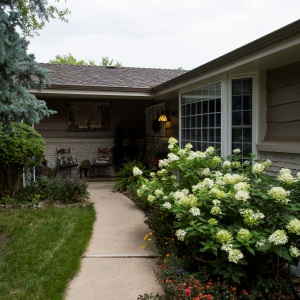
From the courtroom to the stage: How a St. Paul’s summer program brings students from 61 New Hampshire schools together
Earlier this month, New Hampshire federal judge Joseph Laplante passed along a last-minute message to administrators of a high school program at Concord’s St. Paul’s School: His courtroom was about to become the national epicenter of the fallout from President Trump’s executive order on birthright citizenship, and Laplante, an alumnus of the program, thought this year’s students ought to be there.

Officials identify victim in fatal Concord fire that displaced 12 residents
Charred remnants of vinyl cladding still hang from the second-story windows of a Concord apartment building, the aftermath of last week’s destructive fire that tore through the 10-unit complex at 151 Manchester St.
Most Read
 Most New Hampshire homes aren’t ‘aging-ready,’ which is a problem in a rapidly aging state
Most New Hampshire homes aren’t ‘aging-ready,’ which is a problem in a rapidly aging state
 Celebrating National Ice Cream Day with Richardson’s Farm: ‘Nobody else does what we do’
Celebrating National Ice Cream Day with Richardson’s Farm: ‘Nobody else does what we do’
 Don Brueggemann, owner and manager of The Works Café, retires after 30 years downtown: ‘A great run’
Don Brueggemann, owner and manager of The Works Café, retires after 30 years downtown: ‘A great run’
 Riverbend to close adult mental health housing facility in Concord due to funding challenges
Riverbend to close adult mental health housing facility in Concord due to funding challenges
 Surplus seller Ollie’s enters New Hampshire, opens in Belmont
Surplus seller Ollie’s enters New Hampshire, opens in Belmont
 Free speech group, residents back Bow parents’ appeal in case involving transgender athletes
Free speech group, residents back Bow parents’ appeal in case involving transgender athletes
Editors Picks
 A Webster property was sold for unpaid taxes in 2021. Now, the former owner wants his money back
A Webster property was sold for unpaid taxes in 2021. Now, the former owner wants his money back
 Report to Readers: Your support helps us produce impactful reporting
Report to Readers: Your support helps us produce impactful reporting
 City prepares to clear, clean longstanding encampments in Healy Park
City prepares to clear, clean longstanding encampments in Healy Park
 Productive or poisonous? Yearslong clubhouse fight ends with council approval
Productive or poisonous? Yearslong clubhouse fight ends with council approval
Sports

Bow Brook Tennis Club hosts men’s A and B tournaments
The Bow Brook Club has a long history in Concord. Every year, except during breaks during both world wars, it has hosted a citywide men’s tennis tournament on red clay.
 Concord National LL Softball wins State Championship and moves on to Little League Regional Tournament
Concord National LL Softball wins State Championship and moves on to Little League Regional Tournament
 Josiah Hakala of Beaver Meadow wins State Amateur golf championship
Josiah Hakala of Beaver Meadow wins State Amateur golf championship
 Youngsters Richardson and Hakala move on, and veterans crash out at 122nd State Amateur Championship
Youngsters Richardson and Hakala move on, and veterans crash out at 122nd State Amateur Championship
 Athlete of the Week: Grace Saysaw, Concord High School
Athlete of the Week: Grace Saysaw, Concord High School
Opinion

Opinion: Trumpism in a dying democracy
 Opinion: What Coolidge’s century-old decision can teach us today
Opinion: What Coolidge’s century-old decision can teach us today
 Opinion: The art of diplomacy
Opinion: The art of diplomacy
 Opinion: After Roe: Three years of resistance, care and community
Opinion: After Roe: Three years of resistance, care and community
 Opinion: Iran and Gaza: A U.S. foreign policy of barbarism
Opinion: Iran and Gaza: A U.S. foreign policy of barbarism

Your Daily Puzzles

An approachable redesign to a classic. Explore our "hints."

A quick daily flip. Finally, someone cracked the code on digital jigsaw puzzles.

Chess but with chaos: Every day is a unique, wacky board.

Word search but as a strategy game. Clearing the board feels really good.

Align the letters in just the right way to spell a word. And then more words.
Politics

New Hampshire school phone ban could be among strictest in the country
When Gov. Kelly Ayotte called on the state legislature to pass a school phone ban in January, the pivotal question wasn’t whether the widely popular policy would pass but how far it would go.
 Sununu decides he won’t run for Senate despite praise from Trump
Sununu decides he won’t run for Senate despite praise from Trump
Arts & Life

Community Players of Concord celebrate 97th season, prepare for 98th
To celebrate the conclusion of their 97th season, the Community Players of Concord came together for an annual meeting including a pot-luck dinner and the presentation of a number of theatrical awards.
 Henniker Blues, Brews & BBQ Fest returns for fourth year
Henniker Blues, Brews & BBQ Fest returns for fourth year
 Artist Spotlight: Holly Emrick
Artist Spotlight: Holly Emrick
Obituaries
 David Franklin Whitney
David Franklin Whitney
Hillsboro, NH - David F. Whitney 87, a lifelong resident of Hillsboro, NH., joined his bride Patricia A. (Wing) Whitney in Heaven Thursday June 26,2025. Born September 10, 1937 to Harry L. and Harriett S. Whitney at their home on Wh... remainder of obit for David Franklin Whitney
 Myrna Prevost
Myrna Prevost
Concord, NH - Myrna Braley Prevost, 88, died on July 11 at The Birches in Concord, New Hampshire. She was predeceased by her beloved husband of 62 years, Fernand Prevost. Myrna was born August 20, 1936, in Franklin, New Hampshire. The ... remainder of obit for Myrna Prevost
 Annette Lamoreau Wolfe
Annette Lamoreau Wolfe
Concord , NH - ANNETTE LAMOREAU WOLFE Passed away surrounded by family on -5/9/2025 at the age of 88 yrs old. She was born in Presque Isle, Maine, the daughter of the late Paul Lamoreau and Ruth (Hasey) Lamoreau. Annette is survived by ... remainder of obit for Annette Lamoreau Wolfe
 D. Jacqueline Lavigne
D. Jacqueline Lavigne
Tilton, NH - Dorothy Jacqueline "Jackie" Lavigne, a native of Nashua NH and a longtime prior resident of Tilton, NH and of Prescott Valley, AZ passed away on July 3, 2025 at the age of 92, with her devoted children by her bedside. A... remainder of obit for D. Jacqueline Lavigne


 Near Canadian border, local police hail Northern Border Alliance as a visible deterrent to illegal immigration
Near Canadian border, local police hail Northern Border Alliance as a visible deterrent to illegal immigration
 John Broderick leaves as administrator of YDC settlement fund, says legislature ‘took my job away’
John Broderick leaves as administrator of YDC settlement fund, says legislature ‘took my job away’
 Concord National LL Softball to play in second game of NE Regional on Tuesday after loss to Guilford, Connecticut
Concord National LL Softball to play in second game of NE Regional on Tuesday after loss to Guilford, Connecticut
 Concord investigating cause of fire at former signal tower under Water Street bridge
Concord investigating cause of fire at former signal tower under Water Street bridge
 Granite Geek: Air conditioning is killing the planet! Isn’t it?
Granite Geek: Air conditioning is killing the planet! Isn’t it?
 League of NH Craftsmen 92nd annual fair coming to Newbury
League of NH Craftsmen 92nd annual fair coming to Newbury

 Concord became a Housing Champion. Now, state lawmakers could eliminate the funding.
Concord became a Housing Champion. Now, state lawmakers could eliminate the funding. ‘A wild accusation’: House votes to nix Child Advocate after Rep. suggests legislative interference
‘A wild accusation’: House votes to nix Child Advocate after Rep. suggests legislative interference  Town elections offer preview of citizenship voting rules being considered nationwide
Town elections offer preview of citizenship voting rules being considered nationwide Concert on the lawn coming to Pierce Manse
Concert on the lawn coming to Pierce Manse Nate Lavallee, July Young Professional of the Month: Stretching toward strength, self-care and Southern NH wellness
Nate Lavallee, July Young Professional of the Month: Stretching toward strength, self-care and Southern NH wellness
